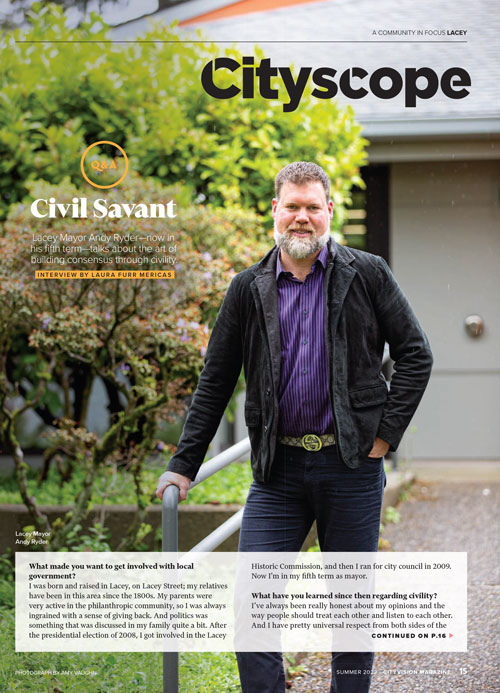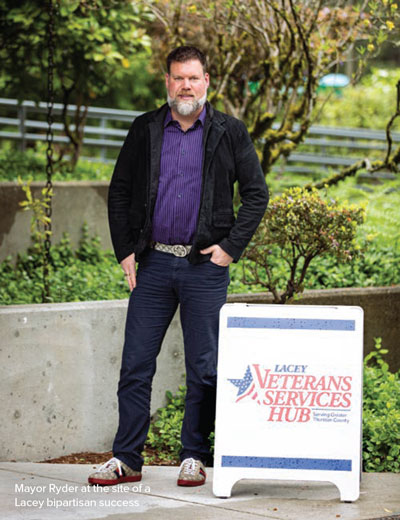Interview by Laura Furr Mericas
What made you want to get involved with local government?
I was born and raised in Lacey, on Lacey Street; my relatives have been in this area since the 1800s. My parents were very active in the philanthropic community, so I was
always ingrained with a sense of giving back. And politics was something that was discussed in my family quite a bit. After the presidential election of 2008, I got involved in the Lacey Historic Commission, and then I ran for city council in 2009.
Now I’m in my fifth term as mayor.

What have you learned since then regarding civility?
I’ve always been really honest about my opinions and the way people should treat each other and listen to each other. And I have pretty universal respect from both sides
of the political aisle, which is something that you just don’t see very often today.
When Lacey’s city council elected you mayor in 2014, it did so with a contentious 4-3 split. Did you reach out to those who voted against you?
Throughout that [first city council] meeting, I could tell a couple members were
uneasy. I wanted to and I continue to try to build consensus. I think that is one of the most important things you can do as mayor. I ended the meeting by saying, “Keep it classy, Lacey. I call this meeting adjourned.” And I have done
that at the end of every regular city council meeting. At first people thought it was just a joke, but what I’m really saying is: we need to be civil to each other.
Is modeling civility a form of leadership?
You need strong leadership in order to implement any sort of plan. And in short, strong leaders bring people together and allow a vision to move forward that everyone can get behind. I think
we’ve been able to achieve a lot for Lacey, where maybe other jurisdictions have struggled, because we have strong consensus on my council.
What’s one accomplishment you’re especially proud of?
Lacey is a strong military community. When I got elected, there were a lot of nonprofits providing services to veterans and families; they just weren’t coordinated.
We came up with this idea of renting a space for them, putting them all underneath one roof, and having them all work together—kind of a one-stop shop.

The Lacey Veterans Services Hub.
We started off with 13 providers and 1,300 square feet. Now we have over 8,000 square feet, and we’ve become the model service provider for veterans and their families. It could only have happened
with 100 percent support of my council, because we put in our general fund dollars to get this off the ground.
How did you build consensus for that, given the division on your city council?
It’s one of the reasons why I really liked working on veterans’ issues, because it seemed like it was one of the last issues that you could
have totally bipartisan support on. We could get a big win underneath our belt and change people’s lives, and then hopefully learn from this experience and [apply it] to other sectors. We’ve taken some of the same concepts, and we’re
working with our school district to find resources for students who are experiencing homelessness.
Being a good elected official is being a good listener. Even if you completely disagree, try to at least understand how they came to that conclusion.
Recently you’ve spoken out about threats against elected officials. What prompted that?
The National League of Cities did a survey with elected officials and asked if they had faced any threats of violence in the past several
years. More than 80 percent said yes. That is unacceptable. We don’t expect people to agree with us all the time, but we expect people to be civil. I think it starts with the leadership. Someone has to set the example of how you treat other
people.
Is that especially true for electeds?
I think a lot of elected officials have gotten elected because they’ve taken a hard stance on an issue and even been uncivil about it. That has attracted a new set of voters who are agreeing
with that temperament. The problem is the tyranny of a minority within local government. They scream the loudest; they’re the most involved; they’re well organized. They can really do strong campaigns, but they don’t necessarily
represent the majority of your community….Now you’re getting into a policy that may not be what’s best for your community. And that is a recipe for disaster, and it stops progress.
Bottom line?
Being a good elected official is being a good listener. Even if you completely disagree, try to at least understand how they came to that conclusion….Then the next thing you have to do is find out where you can
find agreement. It’s not all or nothing.
